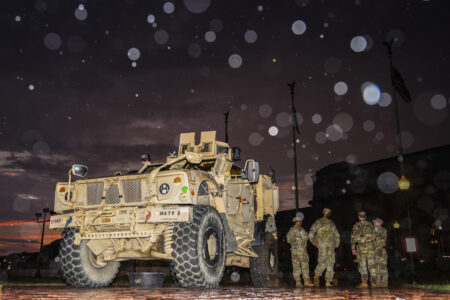Rick Larson: Greatness at the margin

A guitar is buried in Marshalltown. This is why.
A flash point is possible in grassroots-level live music. An organic, vital moment in which emotional and sensory phenomena coalesce in a connected soloist’s muse articulation. The spark surges through the crowd, electrifying the atmosphere and leaving listeners viscerally touched.
Skin crawls. Grins erupt. Shouts ring out. And all is right with the world — at least for that moment.
Marshalltown’s Rick Larson found his way into that magical moment of greatness — more than once, if truth be told — as had so many unsung beat champions before him.
My older brother knew his life’s purpose from an early age. He got his first guitar when 12 and devoted himself to single-minded pursuit of earthly calling.
The demands of post-teen life typically compel small-pond players to pursue day jobs, Music is relegated to hobby status, if even that. But Rick never stopped. Because he and music were of a piece. To him, no other pursuits mattered.
He never cut an album, shot a video, or graced a magazine cover. What he did was more important. A veteran of the bar-band culture, he helped keep Blues and Rock’n’Roll alive before average people every night.
Songs to which grassroots blue-collar crowds today thrill have roots in America’s rich cultural mosaic and wonderfully diverse heritage. Tempos, melodic inclinations, and engaging rhythms from a score of shores met here and became new and as one.
American songs derive from the Appalachian Mountain country and humming streets of Chicago. They hail from the highways that crisscross the land and from the farmlands. From the cities, swamps, and suburbs. And they are born from common experiences, telling of human struggles, aspirations, pains, and triumphs.
It is through the efforts of local players like Rick that folk stories and voices survive from generation to generation. A country’s music serves as both a popular record and expression of national character.
Rick was professionally active in central Iowa from the seventies through the mid-nineties. Indeed, the area live music circuit was richer for his indefatigable participation.
He co-founded numerous central Iowa groups: Amo, Armed and Dangerous, Party House, Ice Age, the Vipers, Commotion. And too many more to mention. Singer/harp player Mark Goodman and drummer Frank McDowell were usually in the mix. Accompanying players included keyboardist Doc Lawson and guitarist/vocalist Dave Taylor.
Rick’s groups elated folks in Marshalltown bars long vanished: The Melody, Office, Mom and Dad’s, Pyramid, and numerous others. Stages in other Central Iowa towns like Des Moines, Tama, and Gladbrook were trod.
Established band names or line-ups were not required. If a last-minute party jam presented itself, Rick would be there. Guitar in hand, amplifier on.
No prisoner of stylistic convention, he was as likely to rock the joint as finesse a melody. He made all the right stops, from red-hot jumpin’ to cool-blue orating. His intoxicating soloing interpreted heartache, passion, and kick-out-the-jams exuberance. Lesser players were made conscious of their limitations.
Stevie Ray Vaughn, Keith Richard, Chuck Berry, Buddy Guy, Joe Strummer, Pete Townsend – these were his influences. He played the music that spoke to him, and it became important to his audiences.
Rick had something crucial to worthwhile musicianship: a direct line between his heart and his art. He believed in each note he touched.
A few of the better chart songs sometimes crept into the late night sets. But only the better ones. For Rick, ignoring his instincts and selling out his musical integrity were simply not options. The gold ring mattered less than the music. The moment.
Devoted rank-and-file bar musicians like Rick who keep music alive — who realize that all-important moment — are infinitely more significant to real-world listeners than is the trendy WRIT LARGE corporate music-product industry that takes listeners for granted.
For every fabricated chart sensation, there are innumerable unsung authentics. And greatness belongs to them, too. Perhaps most of all.
For it is possible to reach greatness without the larger world being aware.
Rick did.
His guitar fell silent in 1998. We laid to earth with him the cherry wood-grain, Gibson SG Standard that had been his earliest performing guitar. It was only right that they remain together into perpetuity. Together, they had realized the moment.
That is how I know that greatness can flourish at the margin.
And that is why a guitar is buried in Marshalltown.
——
The foregoing essay was adapted from DC Larson’s 2017 book, Flesh Made Music (Retro Riff).



